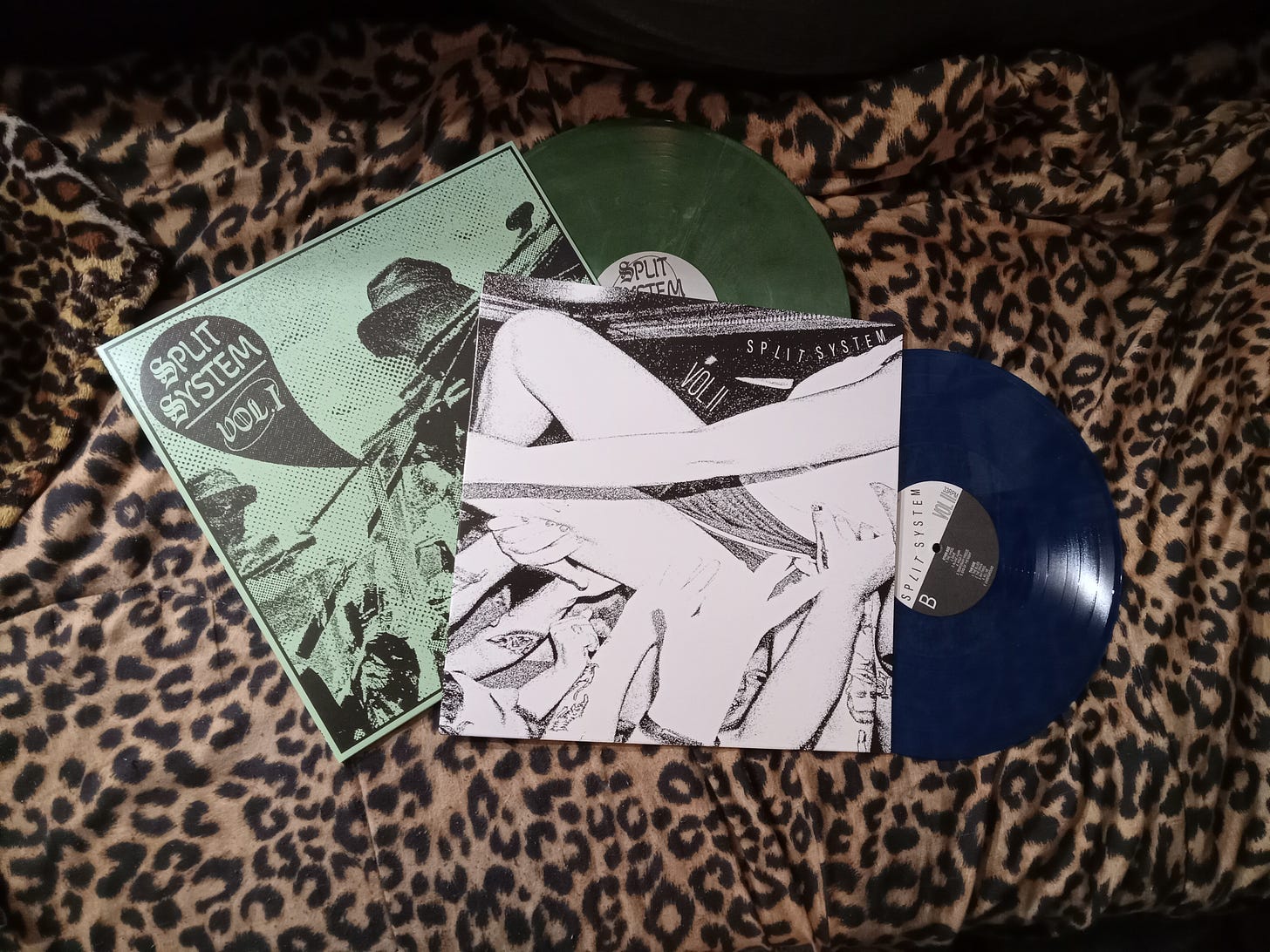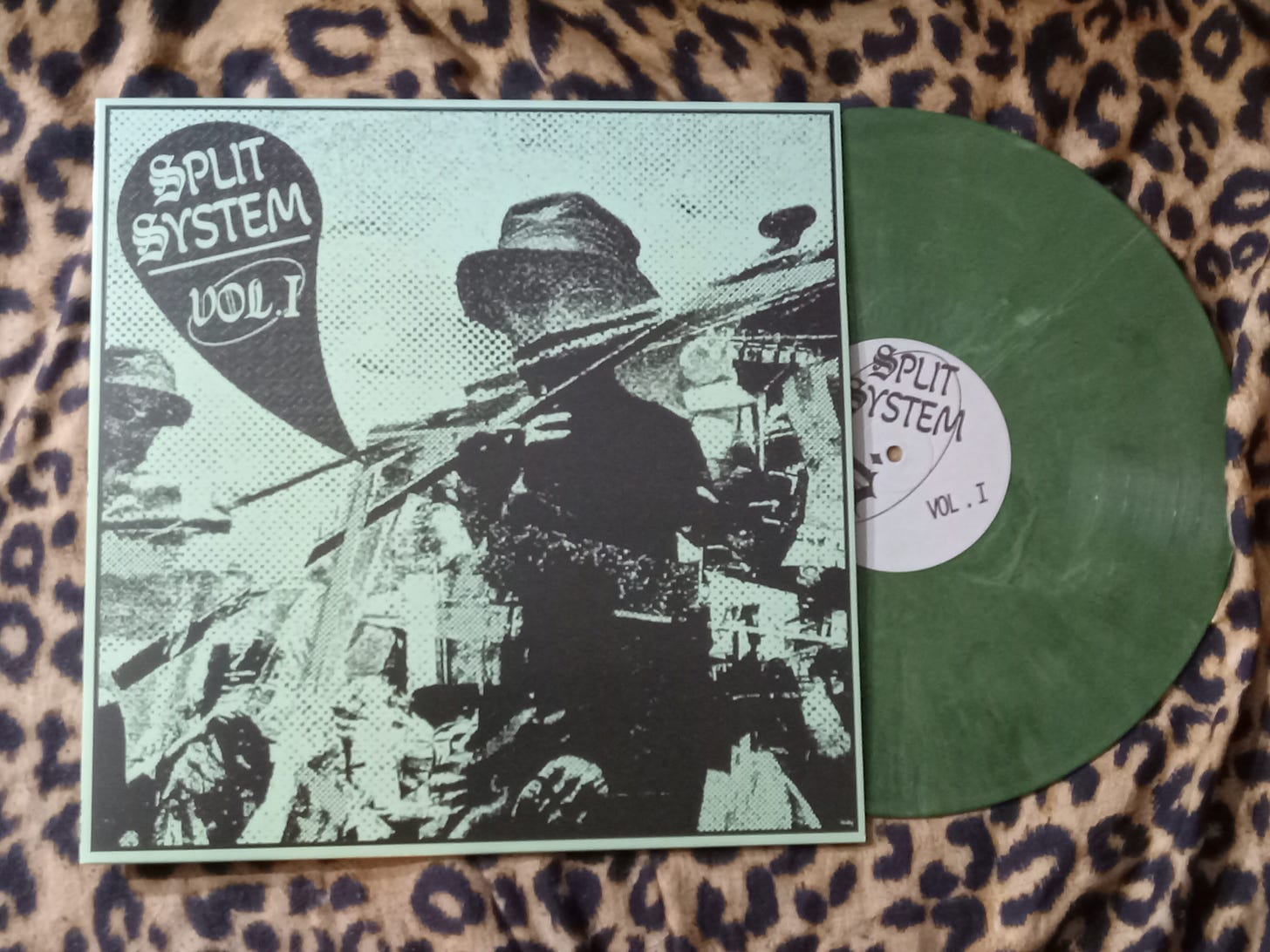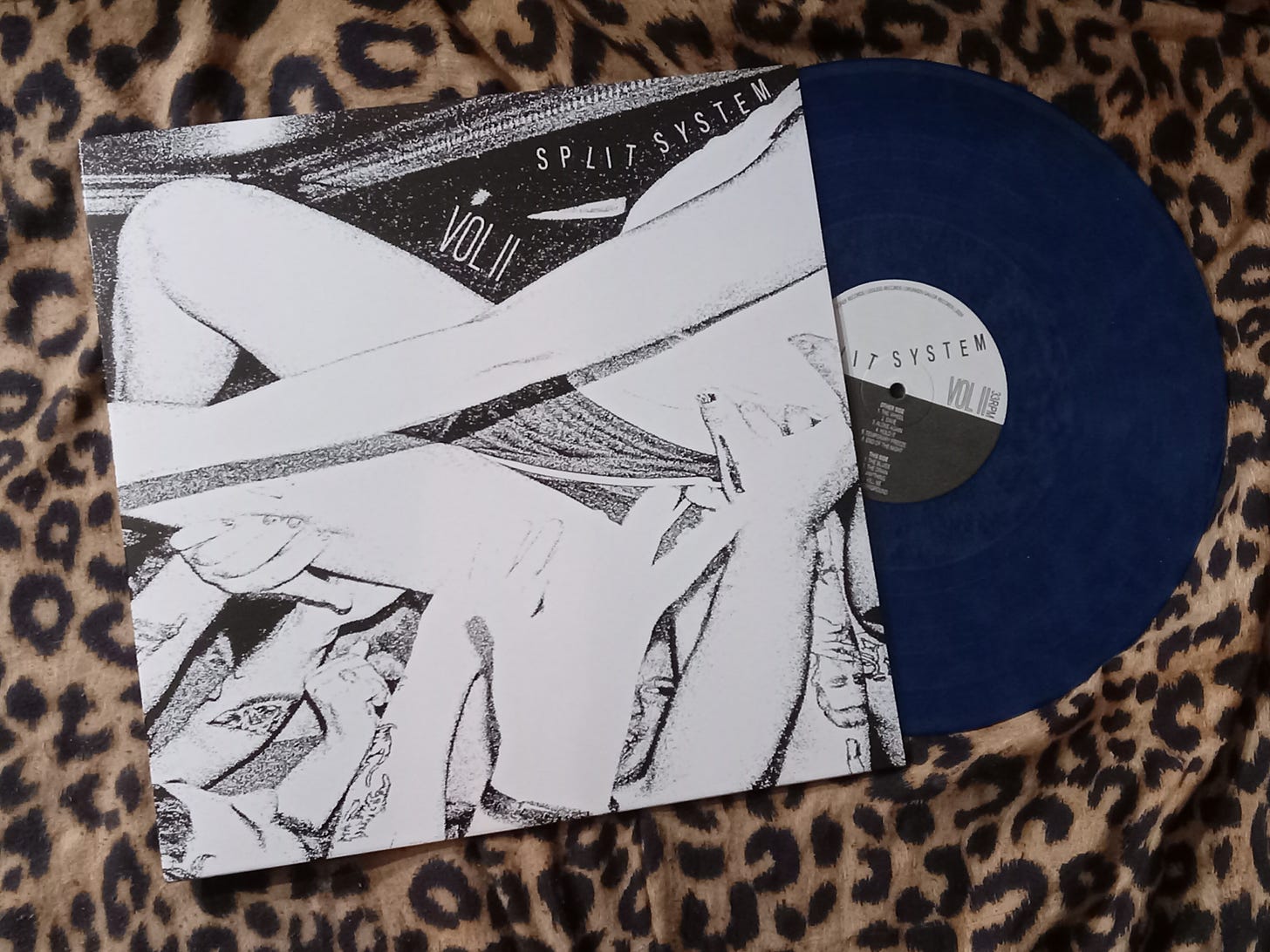Split System, and the Subtle Art of Power Trash!
How this Melbourne mob just joined The Sleeveens and Wesley & The Boys on the shelf marked Tim’s New Favorite Band.
“RIFF-CRAZED AUSTRALIAN PUNK!” screams the promo sticker riding Goner Records’ US pressing of Vol. 2, the second LP released by Melbourne grunt-punks Split System. Which is as real as truth-in-advertising gets. But upon first blush, I’m reminded of the slogan The Replacements scrawled across their absolutely perfect debut Sorry Ma, Forgot To Take Out The Trash?
“File Under: Power Trash”
But Split System’s Power Trash isn’t just about volume, and they ain’t just another gang of garage punks trying to sound like Dead Boys B-sides. Both 2024’s Vol. 2 and 2022 debut Vol. 1—plus their recent Live in Stockholm set and a seemingly endless stream of 45s and EPs—take a huge, hulking Marks-A-Lot and scrawl “VELOCITY AND INTENT” across your walls. In bold capitals. It’s melody in a straitjacket, riffs like broken glass, vocals half-snarled/half-sung. And they’ve managed all this while I had my head stuck in (writing) a fucking book!
Split System’s lineup is drawn from some of the best garage punk outfits in town: Jackson Reid Briggs & The Heaters, Stiff Richards, Doe St, Speed Week, The Black Heart Death Cult, and No Zu. Alongside recent Heroes of The ‘Stack like The Sleeveens and Wesley & The Boys, Split System are symptoms of a moment. Not just one borne of Melbourne—which appears to be spawning more raw, filthy young rock ‘n’ roll bands than anywhere on Planet Punk this side of Nashville—but the whole damned garage-punk chain reaction that’s been crawling out of basements since COVID stopped being an excuse. These are the kind of bands that happen when a city gets too restless and too smart at the same time, and garage rock becomes a weapon again.
Split System ain’t just Aussie punk, ain’t just the antidote to The Chats (who are dumber than their riffs, and those could be played by a crippled, asthmatic monkey), ain’t just the one band who could teach the otherwise brilliant Amyl and The Sniffers a thing or two about unadulterated raunch. This is music with infection and inflection. This is somebody bleeding all over a jagged-edge pop hook. Their guitars rattle like loose teeth in a blender, their drums pound like they’re trying to wake the fuckin’ dead. It sounds like Radio Birdman hit the bottle with The Saints, puked on a Motörhead record, and then actually meant it.
Then nine songs into Vol. 1, they uncork “Ultimatum,” a riff-rocker so stompingly AC/DC, Bon Scott just clawed his way out of his coffin to bum a cigarette. Which indicates that, more than being Melbourne’s answer to The Devil Dogs, Split System just might be the second coming of Rose Tattoo.
Imagine AC/DC got blackout drunk, stole a biker bar jukebox, and decided punk was too tame. So they bolted a slide guitar to it and turned every song into a bare-knuckle sermon about booze, betrayal, and blood loyalty.
That’s Rose Tattoo. That’s Angry Anderson, standing five-foot-nothin’ and looking like he could knock out God. That’s riffs like crowbars and drums like fistfights echoing off rusted corrugated iron.
They weren’t “hard rock.” They were pub-fuckin’-combat, with the Ramones’ velocity and Motörhead’s grease, but somehow more Australian than both. Slide guitar in punk? Who the hell does that? Rose Tattoo did. And it worked! Like throwing a bottle of bourbon at a train and somehow making it speed up.
Rose Tattoo was what happened when punk rock tried to wear a sleeveless denim biker vest, but the vest punched back.
And that’s the lineage Split System are drawing from. You hear it in “Ultimatum.” You feel it every time they grind instead of sprint. They’re not trying to sound like Rose Tattoo. They’re living in the shadow those bastards cast, and learning how to throw elbows in it.
But The Devil Dogs, you ask? Now those bastards were the booze-soaked cartoon wolf version of punk rock. If Rose Tattoo were a bar fight in a freight yard, The Devil Dogs were the afterparty in a flaming trash can. If Rose Tattoo were the sound of a punch, The Devil Dogs were the grin afterward—the busted-lip, half-drunk cackle that tells you the night ain’t over yet.
The Devil Dogs took Ramones minimalism, Stones sleaze, and ’50s rock’n’roll grease, and shoved it through a wall of cheap tube amps until it sounded like Little Richard leading The Dictators. Every track was either about girls, beer, or breaking something on purpose. And somehow, they made it sound noble.
They weren’t hard—they were feral. They weren’t tight—they were exhilarated. And they made the idea of fun in punk dangerous again, like the party might explode at any second.
Where Rose Tattoo gave Split System their menace and stomp, The Devil Dogs gave them their smirk and swing. The Rose Tattoo side grinds and growls. The Devil Dogs side kicks open the bathroom stall with a grin, a riff, and blood on its knuckles.
Split System doesn’t sound exactly like either, but you feel both bands in the marrow. The Devil Dogs gave ‘em the hooks. Rose Tattoo gave ‘em the bruises. And Split System turned the hybrid into a wrecking ball with melody.
The thing is, without songwriting smarts and a certain attention to detail, music as brutal as Split System’s can quickly turn to sludge, slop, amateur-hour demolition. Worse, it becomes empty posing. The riffs lose definition, the songs blur together, and what was supposed to feel dangerous starts to feel like a migraine in denim.
That’s the difference between Split System and the pretenders. These guys build structures out of chaos. Without that, you get bands who mistake distortion for conviction. The result is noise without nerve, a big dumb racket chasing its own tail. Split System know the difference between distortion and direction, and that’s why they hit like a hammer instead of a hangover.
One big distinction is that Split System has two guitarists, Arron Mawson and Ryan Webb, who understand that volume without shape is just vandalism. They don’t bury their riffs; they carve ‘em out, every note sharp enough to draw blood. They don’t drown the songs in distortion; they weaponize it. They know the trick isn’t how loud you play, but how cleanly you can cut through the noise: “I’ve always preferred single coil (pickups),” Mawson told No Echo. “Nothing beats the sound of a cheap Fender pushed too hard.” Few things make individual notes ring clearer through fuzz thick enough to pad an emergency 747 landing.
Which brings us to Split System’s songwriting, which has grown between their two LPs like black mold in my bathroom. On Vol. 1, Jackson Reid Briggs was content to scribble and bawl straight from the 25-words-or-less end of rock ‘n’ roll songwriting:
Down on the street
Shuffling your feet
Shuffling your feet
Down on the street
Down on the street
Lather, rinse, repeat. No, the lad’s hardly the new Dylan…
Come Vol. 2, it’s like Briggs realized this and said, “Oh, shit! I seriously need to up my game!” The lyric sheet reads like a collection of essays, compared to the haikus of Vol. 1. What’s more, the essays he’s bawling express real emotions, rather than serving as soundtracks for a bit of aggro:
You know you used to be the air I’d breathe baby
You know you used to be my only escape plan
Listen to you every night until I closed my eyes
Lust not yet enough to lose
In the sea I swim
Try not to close my eyes
Swim and swim again
Don’t leave me behind
This breed of poetic melancholy invests every one of these tracks. It’s like Briggs has hit his John-Lennon-writing-”Help” moment. It’s still simple, still rock ’n’ roll, but now he’s bleeding on the page instead of just barking.
Which is probably why Andrew Robinson’s production is cleaner than Vol. 1’s, and Split System plays these songs like The Saints ca. Eternally Yours re-recording (I’m) Stranded in its entirety: Same jagged teeth, but now there’s songwriting muscle, dynamics, that sense of “we can still kick your ass, but we can also stretch this thing into actual songs.”
So the arc is clear: Vol. 1—brute force hybrid. Vol. 2—those same songs reimagined with better mics, deeper scars, and actual lyrics. Split System has done this without losing their feral core.
But the whole record feels like it’s building up to its penultimate track, “Kill Me.” It’s a monster. Starts with menace, builds into a wall of noise that doesn’t let up. Not a dirge, not a ballad—this is ritual exorcism. Every band needs one track that says, “We mean it so much, it might destroy us.” This is theirs. The fact it doesn’t collapse under its own weight? That’s proof they’ve leveled up since Vol. 1.
“Kill Me” is their “Nights In Venice” moment, not for length—hell, The Saints stretched that thing past the six-minute mark ‘cause Chris Bailey wanted to ride it ‘til the wheels fell off—but for scope. It clocks 3:40, about seventy seconds past their 2:30 kill zone, and it feels like a miniature apocalypse. The tension climbs, the air thins, and suddenly you hear command as well as chaos. It’s the one track where Split System stops sprinting and lets the madness sprawl just enough to feel like the room’s caving in. What you hear is control, not clutter.
It’s their moment of excess, their statement cut. Every great punk record needs one—a song that says, we’re not just fast, we’re overwhelming. “Nights in Venice” did it for (I’m) Stranded. “Kill Me” does it here for Vol. 2.
Which leads us to Live In Stockholm, which sold out its limited vinyl pressing on Mawson’s co-owned Legless Records quicker than your average Anal Cunt song. You can still grab it from Split System’s Bandcamp and burn it to CD, like Your Intrepid Reporter did so I could blast it on my Hormones-stickered boombox that no longer plays cassettes.
But live tapes? They’re the real trial by fire. Studio can lie, producers can polish, but onstage it’s either blood and glory or a wet fart. You either get Kick Out The Jams, or you get Frampton Comes Alive. Live In Stockholm may not be their MC5 debut album, but it just might be the Cheap Trick At Budokan of Power Trash. Amps buzz, drums rattle, Briggs’ larynx gets pushed into sore throat territory, guitars overload like Three Mile Island on March 28, 1979. The audience bleeds into the mix—you can hear bodies moving. This is where Split System proves they’ve got anthems, not just riffs. Punk works when strangers shout the chorus like they’ve known it their whole lives, and that’s what’s happening here.
Live In Stockholm is rawer and louder than studio Split System, but it’s locked in. These guys aren’t an assemblage of studio tricks—they’re proof that when the lights go up, the songs don’t crumble, they multiply. But there’s less precision, more danger. It feels like it’s going to derail any second, which is exactly what you want from a Split System gig. It’s pure confrontation, while proving they’ve learned how to write a hook that survives distortion. It’s punk stripped to muscle and nerves, and it feels like they’re trying to outrun their own amplifier feedback while writing The Great Australian Rock ‘n’ Roll Song. And it sounds to me like Split System is winning that race.
Split System reminds us why rock ’n’ roll still matters: because it’s loud, ugly proof that heart and nerve still beat under the static. You can sand down anything else, but you can’t fake conviction. Sure, they’ve got beards that’d make ZZ Top blush and album art that looks like it lost a fight with a photocopier, but none of that dulls the punch. In a world where punk’s been turned into marketing, Split System make it sound like danger again. They don’t want to save rock ’n’ roll! They just want to keep it mean enough to scare the polite out of you! The Great Australian Rock ’n’ Roll Song might still be unwritten, but if it ever shows up, it’ll sound a lot like this.
And yeah, nothing beats the sound of a cheap Fender pushed too hard.
Bonus: Split System live in Sydney 2024:
🎸 The Sound of a Trainwreck You Wanna Dance In Front Of 🎸
Split System doesn’t wanna save rock ’n’ roll. They want to strap it to a shopping cart full of fireworks and roll it into your backyard. If you made it this far, you already know that’s not just hyperbole. It’s witness testimony.
No ads. No SEO slop. No safe takes. Just the noise that moves you and the words that try to match it.
Subscriptions are $7 a month or $52 a year. Full price. Because the work is worth it.
Every subscription says that Power Trash matters. That punk’s still worth writing like it could tear the walls off. And that you’re backing the work that’s backing this kind of band.
Hit the button. Call it your ticket to the basement show the world forgot to gentrify.
Coming Soon: The Kinks, The Mekons, Billy Childish, Brenda Lee, more James Baker, David Johansen and Jimmy Ashhurst, and “The Ballad Of Frank Pugliese!”
#TheTimNapalmStegallSubstack #TimNapalmStegall #SplitSystem #PowerTrash #MelbournePunk #JacksonReidBriggs #ArronMawson #RyanWebb #StiffRichards #DoeSt #SpeedWeek #TheBlackHeartDeathCult #NoZu #TheSleeveens #WesleyAndTheBoys #RoseTattoo #AngryAnderson #TheDevilDogs #RadioBirdman #TheSaints #Motörhead #AmylAndTheSniffers #TheChats #AustralianRocknRoll #GaragePunk #FeralHooks #RaucousSleaze #IndependentVoices #LongformMusicWriting #SupportIndependentMedia #GoPaidItGetsLouder #KeepTheSignalHumming #SubscribeAndSurvive



